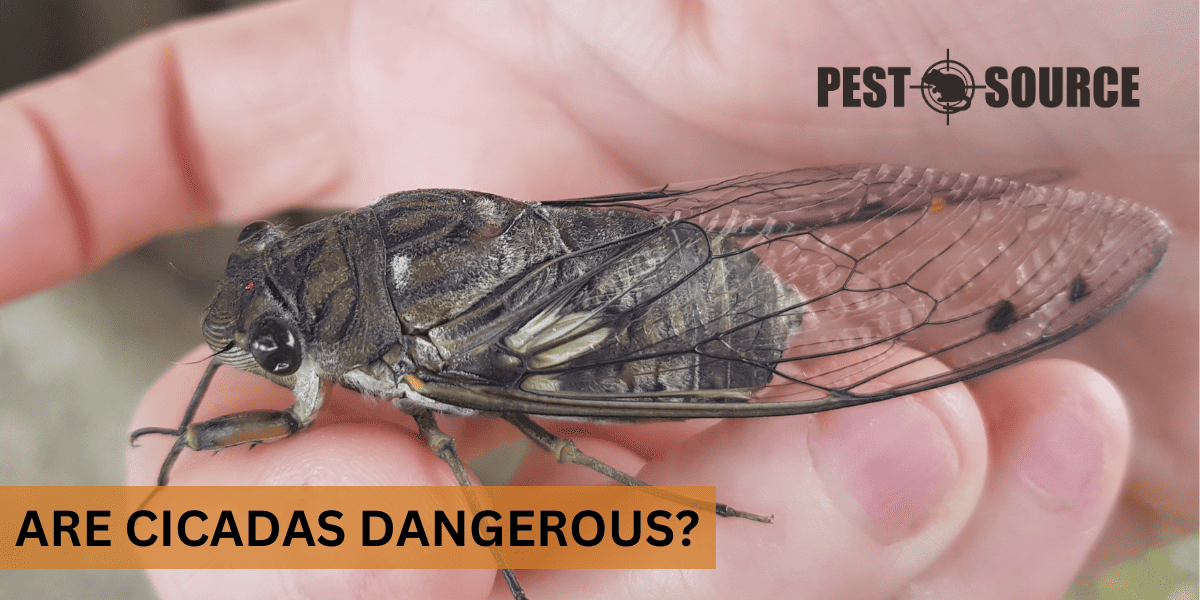Cicadas are not dangerous to humans or pets. While their loud mating calls and large gatherings can be startling, cicadas pose no threat, as they do not bite or sting. Discover more about these fascinating insects and why their emergence is more intriguing than alarming.
POINTS
- Cicadas are not harmful to humans; they do not bite, sting, or lay eggs in human skin.
- While cicadas are not poisonous or toxic, consuming a large number can cause digestive issues in pets.
- Dogs may experience choking hazards, digestive upset, or allergic reactions from eating cicadas, but these are generally not severe.
- Periodical cicadas emerge predictably every 13 or 17 years, while annual cicadas appear every year.
- Cicada 3301 is an online puzzle with no physical threat and should not be confused with the insect cicadas.
Are Cicadas Harmful?
Cicadas often evoke a sense of curiosity and, for some, trepidation due to their large size and the loud, distinctive sounds they make. However, when it comes to the question of whether cicadas are dangerous to humans, the answer is straightforward: cicadas are not harmful to people. These insects, while numerous and occasionally overwhelming in presence, do not pose a threat to human health or safety.
Cicadas are known for their periodic emergences, when they come out of the ground in massive numbers after spending years as nymphs underground. Despite their daunting numbers, cicadas do not have a biting or stinging behavior that would harm humans. Instead, they are primarily focused on mating and laying eggs in the short span of time they are above ground, usually a few weeks.
Do Cicadas Bite or Sting?
When considering the anatomy of cicadas, it’s clear that they are not equipped to bite or sting humans. Cicadas have mouthparts designed for sucking plant sap, not for biting skin or delivering venom.
- Cicada Bites: Cicadas do not bite humans. They might land on a person, but this is usually by mistake, and they will leave when they realize their error.
- Cicada Stings: They are incapable of stinging. Cicadas do not possess a stinger, and their mouthparts are not designed to puncture human skin.
- Egg-Laying: There is a myth that cicadas may lay eggs in human skin. This is false. Female cicadas lay eggs in small twigs and branches, not in animals or humans.
In essence, cicadas are harmless creatures that may be more of a nuisance due to their noise and sheer numbers than any physical threat.
Are Cicadas Poisonous?
Cicadas are not poisonous or toxic to humans or animals. They do not produce any toxins, and there are no venomous species of cicadas. The primary concern with cicadas and pets, such as dogs and cats, is the risk of overindulgence.
- Pets and Cicadas: Dogs and cats may be tempted to play with or eat cicadas. While a few cicadas should not harm your pet, eating too many could potentially cause an upset stomach or an allergic reaction.
- Ingestion Risks: Consuming a large number of cicadas can lead to gastrointestinal discomfort in pets, including vomiting or diarrhea.
- Allergic Reactions: As with any foreign body, there is a small chance that a pet could have an allergic reaction to cicadas.
If you have pets, it’s advisable to monitor their interaction with cicadas and consult your veterinarian if you notice any adverse reactions after they have consumed cicadas.
When Will Cicadas Come Back?
Cicada emergences are predictable and cyclical. There are annual cicadas that appear every year, and then there are periodical cicadas that emerge in large numbers every 13 or 17 years, depending on the species.
In 2022, for example, Brood X, one of the largest and most widespread groups of periodical cicadas, emerged after 17 years underground. These emergences can vary geographically, with different broods appearing in different regions.
Understanding the timing of cicada emergences can help alleviate concerns about their presence:
- Anticipated Timings: Check local resources or entomology websites for emergence calendars specific to your area.
- Geographical Variations: Not all regions experience cicada emergences at the same time or with the same intensity.
While cicadas are not dangerous, knowing when they will appear can help you prepare for the temporary inconvenience they may cause.
Are Cicadas Bad for Dogs?
When it comes to dogs and their interactions with cicadas, pet owners should be aware but not overly concerned. Cicadas are not inherently bad for dogs, but there are some factors to consider to ensure your dog’s safety during cicada season.
- Choking Hazard: Dogs may try to catch and eat cicadas, which can pose a choking risk, especially for smaller dogs.
- Digestive Issues: While cicadas are not toxic, consuming them in large quantities can lead to digestive upset in dogs, including vomiting and diarrhea.
- Allergic Reactions: On rare occasions, dogs may have an allergic reaction to cicadas, which can manifest as skin irritation or more severe symptoms.
To protect your dog during a cicada emergence:
- Supervise outdoor activities to prevent excessive cicada consumption.
- Provide plenty of alternative play options to distract your dog from the cicadas.
- If your dog does eat cicadas and shows signs of distress, contact your veterinarian.



